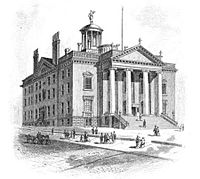54th New York State Legislature
| 54th New York State Legislature | |||||
|---|---|---|---|---|---|
|
|||||

The Old State Capitol (1879)
|
|||||
| Overview | |||||
| Jurisdiction | New York, United States | ||||
| Term | January 1 – December 31, 1831 | ||||
| Senate | |||||
| Members | 32 | ||||
| President | Lt. Gov. Edward P. Livingston (J) | ||||
| Party control | Jacksonian (24-8) | ||||
| Assembly | |||||
| Members | 128 | ||||
| Speaker | George R. Davis (J) | ||||
| Party control | Jacksonian | ||||
| Sessions | |||||
|
|||||
| 1st | January 4 – April 26, 1831 |
|---|
The 54th New York State Legislature, consisting of the New York State Senate and the New York State Assembly, met from January 4 to April 26, 1831, during the third year of Enos T. Throop's governorship, in Albany.
Under the provisions of the New York Constitution of 1821, 32 Senators were elected on general tickets in eight senatorial districts for four-year terms. They were divided into four classes, and every year eight Senate seats came up for election. Assemblymen were elected countywide on general tickets to a one-year term, the whole Assembly being renewed annually.
State Senator Moses Hayden died on February 13, 1830, leaving a vacancy in the Eighth District.
At this time, there were three political parties: the Jacksonians (supporting President Andrew Jackson; led by U.S. Secretary of State Martin Van Buren), the Anti-Masons, and the National Republicans (supporting Henry Clay for the presidency).
The Anti-Masonic state convention met in August 1830 at Utica, and nominated Assemblyman Francis Granger for governor, and Samuel Stevens, of New York City, for lieutenant governor. The National Republicans did not call a convention, and supported the Anti-Masonic ticket.
The Jacksonian state convention met on September 8, 1830, at Herkimer and nominated Gov. Throop for re-election, and Edward P. Livingston for lieutenant governor.
The State election was held from November 1 to 3, 1830. Gov. Enos T. Throop was re-elected, and Edward P. Livingston was elected lieutenant governor.
State Senator Jonathan S. Conklin (1st D.) was re-elected. David M. Westcott (2nd D.), William I. Dodge (4th D.), Henry A. Foster (5th D.), Charles W. Lynde (6th D.), William H. Seward (7th D.), Trumbull Cary (8th D.); and Assemblymen Herman I. Quackenboss (3rd D.) and Philo C. Fuller (8th D.) were also elected to the Senate. Lynde, Seward, Cary and Fuller were Anti-Masons, the other five were Jacksonians.
...
Wikipedia
